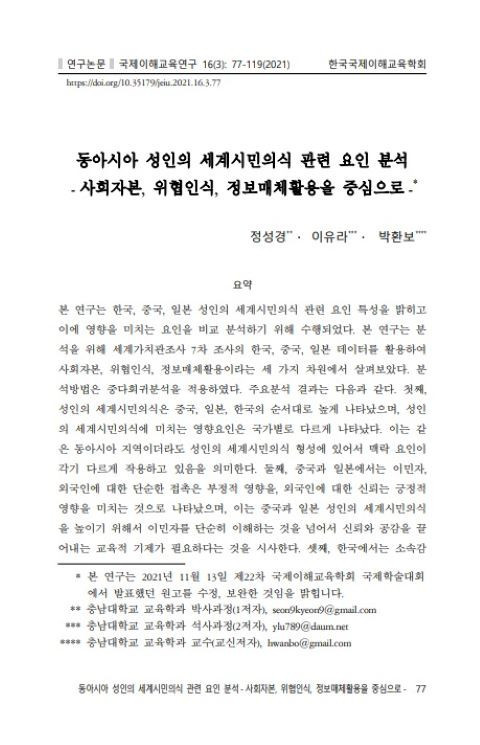
GCED Basic Search Form
Quick Search
当前位置
相关资源

This paper puts an in-depth study on identifying the characteristics of factors related to global citizenship in adults from South Korea, China, and Japan and analyzing the elements affecting them. For this purpose, data from the 7th World Value Survey which was undertaken in South Korea, China, and Japan were used, and they were examined with three different perspectives of social capital, threat recognition, and information media utilization to get to know the influence of variables from various aspects. Multiple regression was applied for this and the results are as follows. Firstly, the global citizenship of adults was high in the order of China, Japan, and South Korea, and the factors influencing global citizenship depend on the country. This implies that contextual factors are acting differently in the formation of the global citizenship of adults even they are from the same East Asian region. Secondly, simple contact with immigrants and foreigners in China and Japan has negative effects while having a positive effect on trust in foreigners. This suggests that an educational mechanism is required to raise trust and empathy beyond understanding immigrants simply to foster global citizenship among Chinese and Japanese adults. Thirdly, depending on the hierarchy of the sense of belonging, the impact on global citizenship was different in South Korea. Educational activities and programs should be implemented to establish the sense of global citizenship of adults in South Korea. Fourthly, the treat perception of social safety and employment insecurity in South Korea and China did not have statistical significance to global citizenship. While the higher the social safety perception the heavier the employment insecurity, adults in Japan had higher global citizenship awareness. This implies that Japanese adults perceive the problems of immigration as a matter of national or social situation and structure. Finally, the utilization of information media in all countries revealed statistical significance, which means that attitude for immigrants would vary depending on which information medica is used from those three countries.
